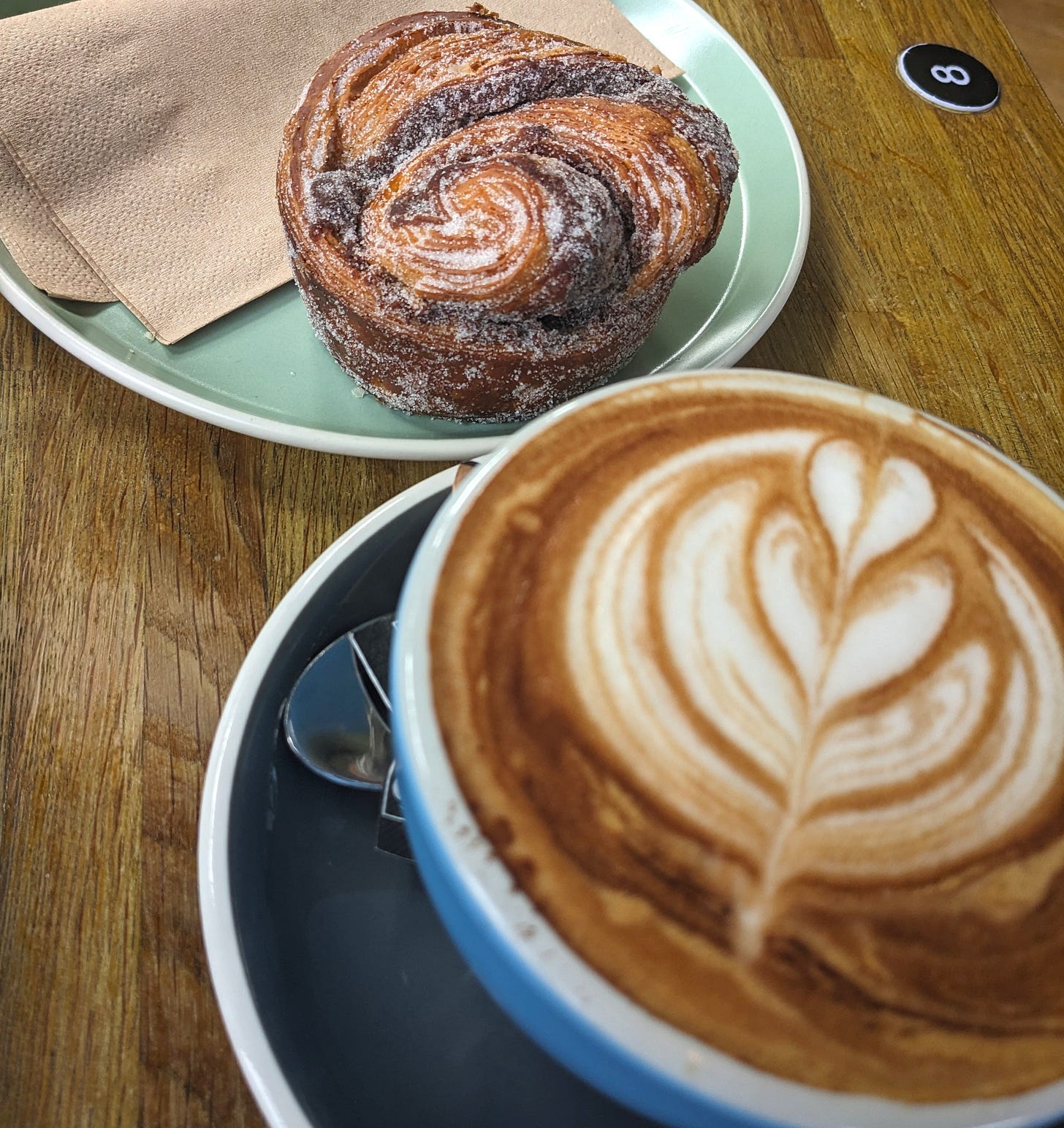Class Identity: Whose Label Is It Anyway?
Musings on money, privilege, and who, and how, we are allowed to be.
Back with a bit of audio this week should you wish to listen along.
In the final episode of The White Lotus season three - *spoiler alert* - Piper sits at the breakfast table with her family, each experiencing their own sorts of ruin despite the luxury setting, and laments both her privilege and newly discovered inability to give it up.
Having tested out the plan to live a year at a Buddhist monastery by way of an overnight sleepover, she comes to realise that the thin, stained, single-bed mattress and plain rice for dinner daily is in fact not how this daughter of a millionaire wants to spend a year of her life. Yet she is still sad about the inequality that exists in the world, the injustice of her having more than others, and the reality that she is a "princess who needs things to be a certain way".
I do not come from millions, and holidaying at any of The White Lotus (or in real life, the Four Seasons) resorts will likely forever be a thing of dreams. But I too struggle with the realities of local and global inequality and where I sit in that, as someone who lives a very comfortable life, and indeed likes things to be a certain way. I hope though that I hold a slightly higher degree of self-awareness than Piper, who is later seen being consoled by mom (played excruciatingly well by Parker Posey) in the hotel's luxury jewellery store.
As a woman from working-class roots, which I still feel strongly connected to, but who now lives a pretty middle-class lifestyle, I have sometimes sensed a feeling of fraudulence in thinking of or describing myself as one class when outwardly I may appear as someone from another. This of course shouldn't matter, it is 2025 and one would hope that we are long done with class-based prejudice or discrimination. But I live in Britain, and I am Welsh, and so I do not think class will ever be untieable from my experiences.
Labelling
Early in my 20s, I was a year or so into a new job, and the office chat somehow turned to class - not unusual for a room of policy nerds whose politics interestingly spread across the full spectrum of left to right. I chipped in with some reference to being working-class, and what that meant to me. Immediately I was laughed at and called out by a colleague whose life experiences and intersectionalities were very different to mine, but also came from a working-class background. He suggested, very plainly, that to call myself the same was an insult, for I did not demonstrate those values. I jumped to my own defence in the moment, though hurt and embarrassed by how this conversation had turned, and reiterated my claim to this identity.
I felt angry at being labelled by someone else, and angry at myself for not being a better flagbearer for what it means to be from where I'm from, and to have been brought up in the way that I was.
Elsewhere, while at university and afterwards, I'd find myself in circles where the line between myself and those who had grown up in middle-class settings couldn't have been more clear. Talk of annual ski trips to far-flung destinations. Learning that 'summer' is actually a verb, and it happens in coastal properties that families may own but do not actually live in. Hearing scoffs at the thought of shopping in Lidl - and cluelessness at the mention of discount variety stores B&M or Home Bargains.
Now, I am someone who has been on a ski holiday - albeit only once, quickly getting confirmation I was made to look at the slopes with a hot chocolate in hand, not be traversing down them. I have also benefitted from friends' holiday homes. My weekly shop is still at the local Lidl - and in my corner of London there are somehow three to choose from - but I'm not opposed to popping into Waitrose too.
But going into Waitrose does not mean I fill up my basket - let alone a trolly - with items for the weekly shop, or even food for dinner that evening. Because even if I can afford to do so, my brain will not justify paying triple the price for something I can get elsewhere. If I'm wandering those aisles, I'm looking out for offers, and for the magic yellow reduced sticker.
If I've deemed anything enough of a bargain, once I've made my purchase, it'll get logged in my spend tracker, down to the penny. This goes for everything I spend, from a cappuccino on the go, to a few pence dropped into a charity pot, to a new book or dress I've bought. I don't rely on apps to calculate and categorise this for me, because I need to be aware of what I am spending, when and how. At the end of each week, I will calculate and categorise myself, logging totals in a spreadsheet, purely for my own reflection and awareness of my personal finances.
I have tracked my spending this way every day since I left home and started university. Every day since I was totally and solely in control of managing the budget I had, whether from loans, grants, earned income, or savings.
Awareness
Tracking personal finances in this way is something I observed, and therefore learned, from my mother growing up. After every shopping trip, or any time money left her purse, she would note it all down, knowing exactly how much was left in the account, bit by bit, until the next payday. To this day, she will sit at the table and review receipts, one payment at a time.
This acute awareness of money, whether tracked so meticulously or not, is something, I think, that is inherent to being working-class - or of working-class origins. Money is not something endless; something you expect, or know, will always be there. It is limited, finite, and needs to be carefully managed if it is to work for you and/or your family in the way it needs to.
I never went without anything as a child. I was clothed and fed and well looked after, and I was never told no when asking for a book. But I know there were times, especially as a single parent, that my mother will have gone without to make sure I didn't. Perhaps not without the essentials, but maybe a pair of shoes she coveted, or a dinner out with friends.
When I asked her about this while drafting this piece she tells me that there was nothing she herself missed out on, or would have liked to spend on as personal treats. What she wishes is that she could have given me more experiences, that we could have done more together, especially in my early years when money was at it’s tightest. But of course I don’t hold memories of that time. Mine are reflective of all the things we did do, all the places we did go, as a two or with others. And of course of all the love and support felt. Privilege shows up in more ways than one.
This awareness, however it may be interpreted, shows up in other subtle ways today. In what people deem to be an expensive item of clothing. In what is considered a reasonable per-head cost at a restaurant, and if, like me, people ask for a doggy bag to take home any leftovers, or are happy to leave what they could not manage to eat on the plate to be scraped into the bin by kitchen staff.
Honestly the thought of food going into the bin makes me quiver, and I will even argue with family members at home about what happens with the leftovers apparently no one wants. While I've never not been able to afford food, and not even because I am aware of other people's experiences with poverty, I just cannot help but be conscious of it’s value, and the pointlessness of it going to waste.
That consciousness is also embedded, I’d argue, in knowing the price of that meal, whether at home or dining out, or even the cost of a holiday, or something material I think ought to be coveted, comes from being aware of the work that has happened to earn the money to pay for whatever it may be.
Learning and Earning; Upper and Under
Working and earning to live is part of what it is to be working-class. Not to become richer and richer, but to have enough to be content with life. If there is a common goal, it is about perhaps moving beyond struggle and strife to land in a more comfortable spot. Comfort that means there is a general certainty that bills will be paid, and the occasional treat may be allowed. But this relies on labour, whether blue collar or white, and with it an awareness of this capitalist exchange. There is also a pride that comes with that, and on the flip side, often a judgement at the lack of pride the upper classes - women like Piper, or her mom, Victoria - are entitled to, where money has been inherited and not earned.
But what about those who do not share this notion? Those who are not beneficiaries of inherited wealth, and yet do not strive for a means to earn capital through work, but rather appear happier to take and receive what they can without such labour.
I distinctly remember the moment in a politics lesson at school during which I was introduced to this notion of an societal under-class; defined as long-term poor, with little chance of improving their circumstances. The word felt so jarring, and yet it described something I instantly recognised. There are structural causes of this, perpetuated by policies that are clearly not working but that no one has managed to fix. But there are also now generations of families, especially where I grew up in the South Wales Valleys, where not working, and surviving on various forms of welfare support - and/or in some cases, funds from crime, or ‘dodgy dealings’ - is seemingly normal, and accepted.
But why? Where is the drive, the ambition, to seek out more? I ask this not with the air of New Right rhetoric, but as someone who sat in school with kids that grew up with a sense of entitlement about what they were owed - from the state, from life - while I felt aware that nothing was guaranteed, and it was on me, on us, to make it all happen.
There are of course projects and programmes that try to offer working-class kids opportunities to see the world in new ways, and that they too could become and could experience so much more. During sixth form, I was chosen to be part of a scheme supporting students from lower socio-economic backgrounds to apply to the universities of Oxford and Cambridge. There were talks and information packs and other such encouragement that "yes you can really do this".
One day, I got to go to Oxford University and meet with a student in Wadham College, who took me around, letting me shadow her in a seminar (of only two, plus the professor!) and talked to me about how she, a working-class gal, had made it there. Wadham is known for it’s diversity and inclusivity, and prides itself on being so, but of course is still part of something so elite.
The experience was somewhat formative. I still remember the face of the student, though not her name, and that her classmate in the seminar room was by chance from another Valleys town (though his accent didn't suggest it). I remember having tea and cake in a cute cafe on the quad, and later meeting back up with my mam and her partner, them having bought me an Oxford Uni t-shirt for that extra bit of encouragement.
For various reasons, I did not end up applying to, let alone attending, Oxford, but I was still the first in my family to go to university - and perhaps that was really the first step in moving towards experiencing this more typically middle-class lifestyle. One of £5 pastries from Gail's and £15 cocktails at a rooftop bar in the city. Of travelling the world to attend friends' weddings - not just heading down to the local town hall. Of having left behind a fascination with what £50 could get me in Primark, and instead tending to invest £50 in one good piece that'll last.
Defining Features
But at my core, I still hold true so many life-long values and beliefs, instilled by my working-class Valleys upbringing. Of looking out for others. Of wanting to share anything good that I have. Of wanting to support small, homegrown makers and producers. Not because it’s hip to buy from the local farmers market (though, of course, now it is, as the £4.80 I unwittingly paid for a punnet of strawberries last weekend tells me) but because I have something of an idea of the strife they face to stay afloat and why they deserve my custom.
Generally, I don’t think that to be working-class comes with the same sense of pride as it once did. Unless perhaps you are of an age where the traditional sense of being working-class applies - those who were miners, dock workers, based in iron and steel plants - where being part of that clan meant something; a clear identity in and of itself.
A community identity.
Today, the new working-class may be seen as much more individually focused, seeking the means to demonstrate the consumption of a certain cultural kool-aid (Kardashian paraphernalia not withstanding), that may earn a mark of respect among one's comrades - but from the outside, perhaps by the middle-class other, will still be seen as something lesser. I could take us down a TOWIE vs Made in Chelsea rabbit hole here... but let's not go there.
All this to say, I feel proud to be working-class.
To be from working-class roots. To have been brought up with a certain set of values. Values I think I still live by - even if I too have turned out to be a princess who likes things to be a certain way. I like nice things. Creature comforts. Overpriced cappuccinos and the idea of afternoons spent reading and not striving.
I don't think that makes me middle-class, but I also wish the thought of it doing so didn't make me feel so uncomfortable. Dictionary definitions offer the word bourgeoise as a associate of the term middle-class, which as someone who has studied Marx, I can’t help but laugh at. At other times, with tongue firmly in cheek, I have described myself, and been described as, a ‘champagne socialist’. Does the latter feel easier because it rings true, or because it comes with oodles of jest?
Who knows.
Because what really is class identity anyway? Can there be a middle ground between each prescribed layer? Who gets to decide? And what does it matter?!
It's not something I use to judge others, and so why hold any concern as to if or how others use it to judge me?
I don't think there are easy answers, and I'm neither a psychologist or sociologist with the intellectual means to work through them in the ways they deserve.
I'm just a girl, watching a wildly clever and popular TV show, thinking and feeling a hundred different things about how one little scene relates to my own life, and ergo offering a little thought provocation for you too.
I’ll end without clear answers then, but with an acknowledgement of gratitude towards the myriad of ways in which I am privileged, materially, and more importantly otherwise. While I hope that one day class might not be such a prolific feature of society at large, for now I will continue to noodle on why and how it lives as such a feature of my inner landscape.
If you enjoyed reading and would like to support my work without a paid subscription, a Ko-fi coffee is always appreciated.☕
Still here? I’d love for you to join me in starting The Artist’s Way next month. If you missed last week’s invitation, take a look here.
🧭💖







